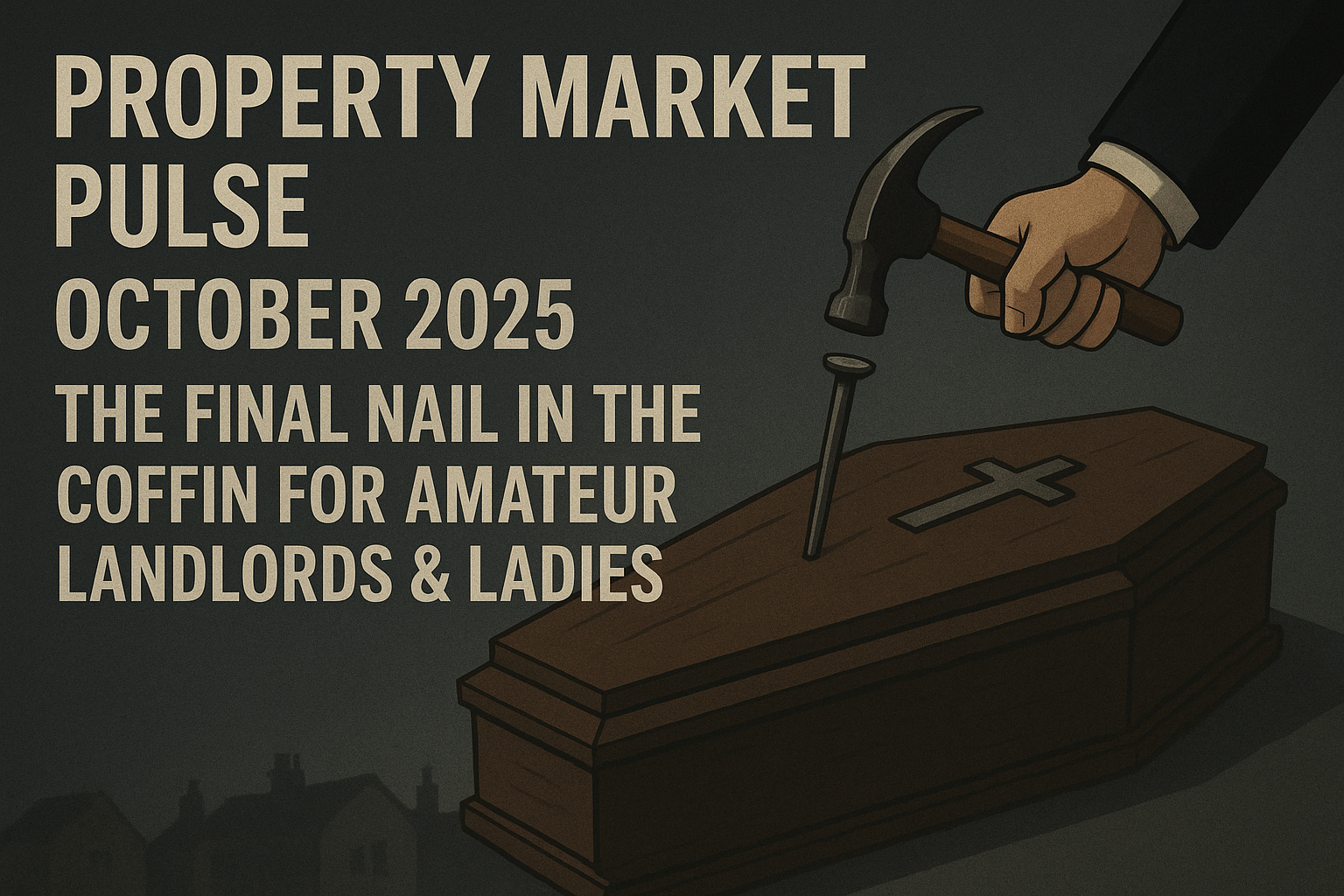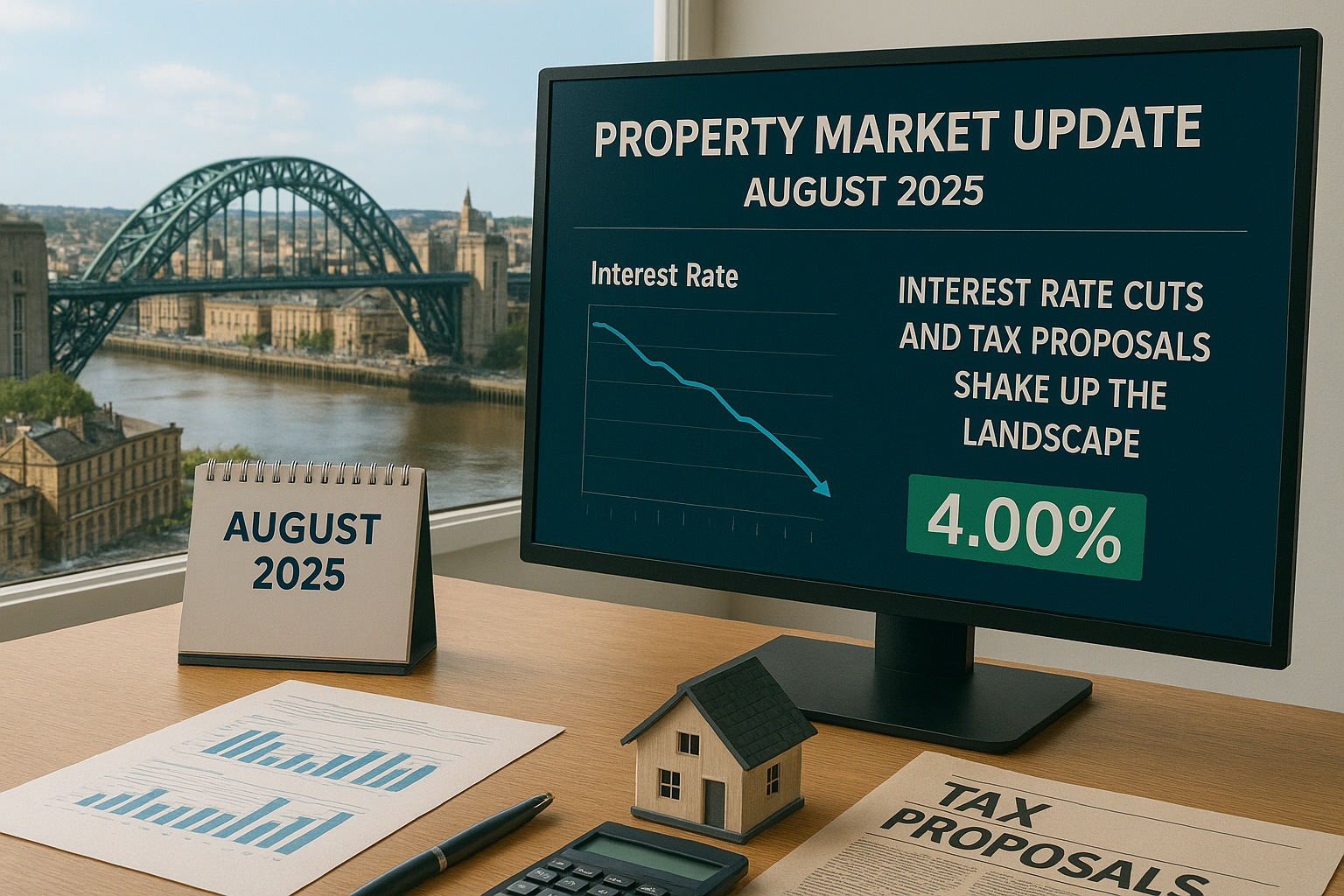Property Market Pulse: October 2025 - The Final Nail in the Coffin for Amateur Landlords, While Cash Investors Thrive


Amateur landlording is officially dead.
But property profits are still very much alive.
October 2025 delivers what many industry insiders are calling the final nail in the coffin for hobby landlords, as regulatory changes complete the transformation of property management into a strictly professional business requiring specialist expertise.
While part-time landlords struggle with the Renters Rights Act implementation and Awaab's Law compliance deadlines, cash investors continue to enjoy strong returns without the mounting complications. Even Bristol Council—with its substantial resources—admits it can't meet the October 27th standards, highlighting the impossible burden now facing small operators.
The pension age increase to 57 for those born between 1971-1973 further accelerates this shift, eliminating a crucial funding source for many landlords while creating perfect timing for cash investors to partner with established property businesses.
Renters Rights Act: Now starts the fun
The Renters' Rights Act has received Royal Assent, bringing the biggest changes to the rental sector in a generation.
While it's business as usual for now, landlords should prepare for major reforms coming within the next six months:
• Abolition of Section 21 "no-fault" evictions
• All tenancies becoming periodic by default
• Mandatory written agreements
• Restrictions on advance rent payments
New enforcement powers will activate within two months, giving local authorities the ability to issue civil penalties up to £40,000 and process rent repayment orders for up to two years.
Later implementations will include a mandatory landlord database, ombudsman registration, and extended Decent Homes Standards.
The government promises "sufficient notice" before implementation, but landlords should start preparing now by ensuring all documentation is current and properties meet compliance standards.
Sources
https://www.nrla.org.uk/news/renters-rights-bill-royal-assent-what-happens-now
Bristol Council admits it may fail to comply with Awaab's Law when it comes into force on 27th October 2025.
Key Points:
- The irony: Bristol Council has been highly critical of private landlords and campaigned for rent controls, yet now admits it can't meet the same standards it expects from others
- The problem: Only one-third of council homes have been surveyed, IT systems need updating, and there's a major repair backlog
- The scale: Over 3,000 council homes suffer from damp and mould, with 300 having repairs delayed over a year
- The blame game: The current Green Party administration blames the previous Labour council for "historical underinvestment"
Awaab's Law requires social housing landlords to fix emergency hazards and dangerous damp/mould within set timeframes - named after two-year-old Awaab Ishak who died from prolonged mould exposure in his social housing.
If you need any help with this, please contact https://www.envirovent.com/ for free advice and or free survey
Sources
North East
- According to the Office for National Statistics, the average house price in the North East was about £164,000 in August 2025, with an annual increase of 6.6% compared to a year earlier.
- The region is therefore among the strongest performers in England in terms of price growth, benefiting from more affordability and less drag from the high-end market.
- From the broader Hometrack Data Systems Ltd UK index: Northern/affordable markets are showing price inflation of ~2-3% or more, while most of the South shows under 1%.
- Implication: For buyers or sellers in the North East, this suggests relative strength — good value compared to the national average, rising prices, and likely stronger buyer activity.
Yorkshire and the Humber
- For this region, the ONS data show an average house price of about £207,000 in August 2025, up from ~£202,000 the previous year — an annual rise of roughly 3.0%.
- The Hometrack index indicates that while growth in northern/affordable markets is stronger than the South, the headline growth rate for the region is more moderate (in the “2-3%” ballpark) rather than the 5-6% seen in some pockets.
- Implication: Yorkshire & the Humber remains affordable relative to many southern regions, but growth is more modest than in the top‐performing northern sub‐markets. For sellers this means realistic pricing is important; for buyers it remains an attractive region with less risk of overheating.
Sources
https://www.hometrack.com/newsroom/uk-house-price-index/
Key Change: From April 2028, the Normal Minimum Pension Age (NMPA) will increase from 55 to 57 years old.
Who's Most Affected:
- People born between 6 April 1971 and 5 April 1973 could lose up to two years of pension access
- Those born before 6 April 1971 are unaffected
- Those born after 5 April 1973 will only access pensions from age 57
Main Impact: If you were planning to retire, reduce working hours, or pay off your mortgage at 55, you might now need to wait until 57. This could mean postponing life plans, taking on debt, or missing opportunities.
Important Notes:
- Some people may have "protected pension age" that could exempt them
- The rules are complex and depend on pension scheme structure and transfers
- People in the affected birth range can only access funds already in drawdown once the NMPA increases
- Professional advice is recommended to understand your specific situation
Sources
https://www.robson-laidler.co.uk/the-normal-minimum-pension-age-is-increasing-could-this-affect-you/
Our Thoughts
The property landscape is shifting fast, and smart investors are already adapting.
The compliance burden is getting heavier. When even Bristol Council admits it can't meet Awaab's Law requirements for its own properties, you know the standards are demanding. Private landlords face the same obligations but with far fewer resources than local authorities.
The pension rule change is forcing decisions. That two-year delay from 55 to 57 might not sound significant, but for landlords banking on pension access to fund property improvements or clear mortgages, it's disrupting carefully laid plans.
The consolidation is beginning. Smaller landlords are selling to more professional operators who can handle the regulatory complexity. Properties are changing hands, but they're not disappearing from the rental market—they're just moving to landlords better equipped to manage them properly.
If you're feeling the pressure of these changes, remember: exiting doesn't mean losing. With current property values and our proven acquisition process, you can unlock your equity without the stress of compliance deadlines or pension delays.
This blog post was written by Chris and Anthony Hunter, founders of Chant Properties Ltd. The information provided is based on market data available as of September 2025 and represents our current understanding of the property market. Always seek professional advice before making investment decisions.
Please fact-check all information before publishing, particularly the statistics, dates, and specific details about policy changes.





